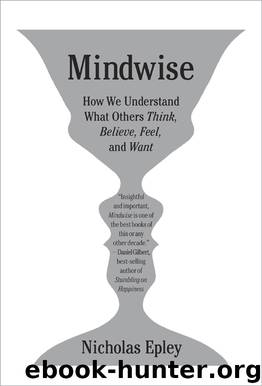Mindwise by Nicholas Epley

Author:Nicholas Epley [Epley, Nicholas]
Language: eng
Format: epub
ISBN: 978-0-385-35167-6
Publisher: Knopf Doubleday Publishing Group
Published: 2014-02-10T16:00:00+00:00
TOO MUCH FROM TOO LITTLE
Brilliant statisticians can look stupid when they conduct analyses on incomplete data. Four days before the 1936 U.S. presidential election, having polled 2.4 million Americans, the Literary Digest predicted a landslide victory for Republican Alfred Landon over Democrat Franklin D. Roosevelt. It was indeed a landslide, one of the largest in U.S. history, but in precisely the opposite direction. Landon won only two states, earning the fewest electoral votes in a presidential election since the 1850s. The Digest’s mistake came from sampling almost exclusively from the two states Landon actually won (Vermont and Maine), using respondents from its own magazine (predominantly conservative), and then interviewing people over the phone (a luxury generally owned by wealthy households at the time). Analyze only part of the data and you’re bound to look stupid.
The implication is obvious. Our stereotypes about people are imperfect assessments of group averages because we poll like the Literary Digest. Each of us views only a small slice of the world’s people, hears only haphazard bits of highly selected evidence from news outlets or other sources, and talks to only a narrow group of generally like-minded friends. Worse yet, some of our beliefs about others (perhaps many of them) are not observed directly but, rather, are learned secondhand through stories told among family members, friends, and neighbors. Our brain’s statistician then runs analyses on the data we’ve seen, imagined, or heard, a data set that has to be less accurate than what we see in the circles test.
In general, stereotypes are more accurate when you’ve had direct experience with a group (such as one you belong to), know a lot about the group in question (because it’s in the majority), and are asked about clearly visible facts (such as about visible behavior rather than about invisible mental states, like attitudes, beliefs, or intentions).13 University students, for instance, have a pretty impressive sense of the behavior and attitudes of other students at the same university.14 Watching, talking, and living with one another gives them reasonably good data to work with. Stereotypes about majority groups also look to be more accurate than stereotypes about minority groups, simply because larger groups provide more observational evidence than smaller groups.15 And communicating with people via mediums that offer only the thinnest amounts of information, like Twitter or text messages or e-mail, is precisely the wicked environment where mistaken stereotypes are likely to persist most strongly.16 The less we know, the more our stereotypes mislead.
This seems obvious enough in theory, but it’s hard to recognize in practice because you can’t know what evidence your brain’s statistician is missing. Consider the common stereotype that women are more emotional than men. You can see the evidence for this almost everywhere you look. Women smile more often, cry more often, and laugh more often than men. Women just seem to feel more than men do—boys don’t cry, after all. But what we all lack is direct access to the actual minds of the average
Download
This site does not store any files on its server. We only index and link to content provided by other sites. Please contact the content providers to delete copyright contents if any and email us, we'll remove relevant links or contents immediately.
| Codependency | Conflict Management |
| Dating | Divorce |
| Friendship | Interpersonal Relations |
| Love & Loss | Love & Romance |
| Marriage | Mate Seeking |
The 5 Love Languages: The Secret to Love That Lasts by Gary Chapman(9809)
Doing It: Let's Talk About Sex... by Hannah Witton(9279)
Should I Stay or Should I Go? by Ramani Durvasula(7667)
The Road Less Traveled by M. Scott Peck(7601)
The Lost Art of Listening by Michael P. Nichols(7506)
Daring Greatly by Brene Brown(6512)
Beartown by Fredrik Backman(5751)
We Need to Talk by Celeste Headlee(5615)
Men In Love by Nancy Friday(5240)
The Rules Do Not Apply by Ariel Levy(4966)
The State of Affairs by Esther Perel(4719)
How To Win Friends and Influence People by Dale Carnegie(4512)
Reflections Of A Man by Mr. Amari Soul(4292)
Pillow Thoughts by Courtney Peppernell(4283)
The Ethical Slut by Janet W. Hardy(4251)
Surrounded by Idiots by Thomas Erikson(4081)
Algedonic by r.h. Sin(4061)
He's Just Not That Into You by Greg Behrendt & Liz Tuccillo(3900)
I Love You But I Don't Trust You by Mira Kirshenbaum(3875)
